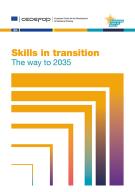Filter by
Publications (54)
RSSThe European Year of Skills – What Comes Next?, the closing event of the European Year of Skills, took place on the 30 April in Brussels and online. Read the event report here.
The European Year of Skills – What Comes Next?, the closing event of the European Year of Skills, took place on the 30 April in Brussels and online. Read the event report here.
This brief contributes to policy on provision of digital skills. It uses data from Cedefop’s second European skills and jobs survey (ESJS2) and provides new evidence by describing the characteristics of the digitally-underskilled in the EU workforce; and identifying characteristics of EU workers.

The second part of this two-volume publication provides an update on the progress made in establishing and implementing national and regional qualifications frameworks around the world since 2019.

This report broadens understanding of what has changed in EU labour markets in the past decade and uses Cedefop’s 2023 skills forecast, sectoral foresight and big data-powered analysis to track ongoing and future trends.

This policy brief discusses developments in the employment and skills of care sector workers, and the role that vocational education and training (VET) can play in support, building on Cedefop’s skill forecast and online job advertisement analysis.
The Making Skills Count Conference is a flagship event of the European Year of Skills. It will take place on 8-9 June in Brussels and online.

This policy brief takes stock of national efforts to improve the quality of international learning mobility in initial VET over the past decade. It shows that countries have made progress, although areas for improvement remain in terms of quality frameworks and policy governance.

The Commission evaluated the actions taken in response to the Council Recommendation on Upskilling Pathways.

The 2023 annual Employment and Social Developments in Europe (ESDE) review, entitled “Addressing labour shortages and skills gaps in the EU”, provides evidence on persistent labour shortages and changing skills needs in the EU.
